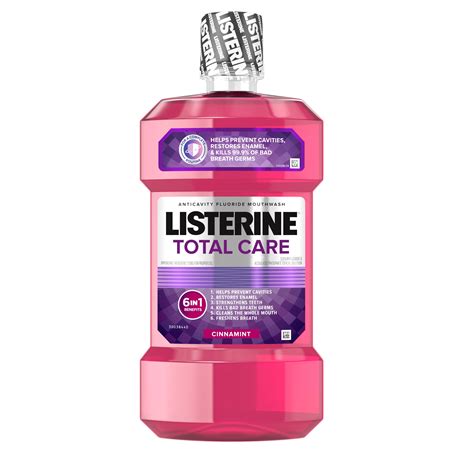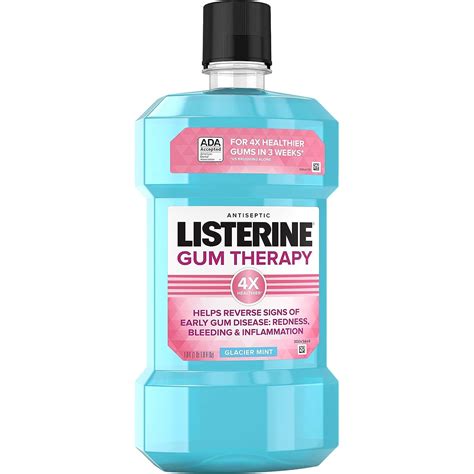Signs of Fake Listerine Mouthwash: A Comprehensive Guide
How to Spot Fake Listerine Mouthwash
Listerine is a popular mouthwash brand known for its effectiveness in killing bacteria and freshening breath. However, with the rise in counterfeit products, it’s essential to know how to spot fake Listerine mouthwash to ensure you’re using a safe and genuine product.
Here are some key signs to look out for when buying Listerine mouthwash:
- Check the Packaging: The packaging should be consistent with genuine Listerine products, with clear and crisp printing and no misspellings or grammatical errors. Look for any signs of tampering or damage, such as ripped or loose seams, misaligned labels, or uneven printing.
- Examine the Bottle: The bottle should be made of high-quality plastic or glass with a smooth finish and no imperfections. The color and transparency should be consistent with genuine Listerine bottles.
- Inspect the Label: The label should include all the essential information, such as the product name, flavor, ingredients, instructions, and warnings. The font should be legible, and the colors should be vibrant and consistent.
- Check the Ingredients: The ingredients listed on the label should match those of genuine Listerine mouthwash. Be wary of products with unfamiliar or unusual ingredients.
- Verify the Batch Code: Most genuine Listerine products have a batch code printed on the bottle. You can often verify the code on the manufacturer’s website or by contacting customer support.
- Consider the Price: If the price seems too good to be true, it likely is. Counterfeit products are often sold at a lower price than genuine ones.
- Buy from Reputable Sources: Always purchase Listerine mouthwash from trusted retailers, such as pharmacies, grocery stores, and online stores with good reputations.
By carefully inspecting the packaging, bottle, label, and ingredients, you can greatly reduce your risk of buying counterfeit Listerine mouthwash. If you have any doubts about the authenticity of a product, it’s best to err on the side of caution and avoid purchasing it.

What Happens If You Use Fake Listerine Mouthwash?
Using fake Listerine mouthwash can have several potential risks, including:
- Health Risks: Counterfeit mouthwash may contain harmful chemicals or bacteria that can irritate your mouth, gums, and throat. This can lead to various oral health problems, such as gingivitis, bad breath, and even infections.
- Ineffectiveness: Fake Listerine mouthwash may not contain the same active ingredients as genuine products. As a result, it may not be effective in killing bacteria, freshening breath, or providing other benefits.
- Allergic Reactions: Some counterfeit mouthwashes may contain ingredients that you are allergic to, leading to skin rashes, itching, swelling, and difficulty breathing.
- Financial Loss: You’re essentially throwing away money if you purchase a fake product. The quality and effectiveness are far inferior, and you may not even receive the promised benefits.
It’s crucial to remember that your oral health is essential for overall well-being. Using counterfeit products can jeopardize your health and cause unnecessary problems. Always buy Listerine mouthwash from reliable sources to ensure you’re getting a genuine and safe product.
Can You Tell if Listerine Mouthwash is Fake by the Smell?
While the smell can be a helpful indicator, it’s not always a foolproof method to detect fake Listerine mouthwash. Genuine Listerine mouthwash has a distinct, strong, and often minty smell that is consistent across different flavors. However, counterfeit products may have a weaker, less pungent odor or even an unpleasant smell.
If you notice a significant difference in the smell from your previous Listerine bottle, it could be a sign of a fake product. However, counterfeiters may attempt to replicate the smell using similar ingredients or fragrances, making it challenging to differentiate.
It’s important to consider other factors like the packaging, bottle, label, and ingredients to determine the authenticity of the product.
How Do I Know If Listerine Is Expired?
Expired Listerine mouthwash may not be as effective as it once was, and it could potentially harbor harmful bacteria or microorganisms.
Here are some signs that indicate Listerine mouthwash has expired:
- Check the Expiration Date: The expiration date is usually printed on the bottle’s label.
- Smell: Expired Listerine mouthwash may have a different, often weaker, or even unpleasant smell compared to fresh mouthwash.
- Color: The color of the mouthwash may change slightly over time. If you notice a significant color change, it’s best to discard the product.
- Consistency: The consistency of the mouthwash may become thicker or thinner than usual.
It’s recommended to discard expired Listerine mouthwash. Even if it still smells and looks okay, it may not be as effective or safe to use.
How Can I Tell If I’m Using Fake Listerine Mouthwash?
Identifying fake Listerine mouthwash after purchase can be challenging, but here are some signs to look for:
- Effectiveness: If you notice that the mouthwash doesn’t seem to be working as well as it used to, or if your breath isn’t as fresh, it could be a sign of a counterfeit product.
- Oral Health Problems: If you experience any unusual irritation, redness, or discomfort in your mouth after using the mouthwash, it could indicate the presence of harmful ingredients or bacteria.
- Allergic Reactions: If you develop any allergic reactions, such as skin rashes, itching, swelling, or difficulty breathing, after using the mouthwash, it’s crucial to stop using it immediately and seek medical attention.
If you suspect you’re using fake Listerine mouthwash, it’s best to discontinue using it and purchase from a trusted retailer.
What Should I Do If I Think I Bought Fake Listerine Mouthwash?
If you suspect you’ve purchased fake Listerine mouthwash, it’s essential to take the following steps:
- Stop Using the Product: Immediately stop using the mouthwash if you suspect it’s fake.
- Contact the Retailer: Reach out to the retailer where you purchased the product and inform them of your concerns.
- Report to the Manufacturer: You can also report the incident to the manufacturer, Listerine, or the relevant authorities.
- Check for Refunds or Exchanges: Depending on the retailer’s policies, you may be eligible for a refund or exchange if the product is fake.
By reporting suspected counterfeit products, you can help protect yourself and other consumers from falling victim to fraudulent activities.
Is It Safe to Use Expired Listerine?
Using expired Listerine mouthwash is generally considered safe but not as effective as using a fresh bottle. While the active ingredients may not be as potent, it’s unlikely to cause significant harm.
However, using expired Listerine could lead to a few potential issues:
- Reduced Effectiveness: Over time, the active ingredients in Listerine may degrade, reducing its effectiveness in killing bacteria and freshening breath.
- Potential Bacterial Growth: While Listerine contains alcohol, which acts as a preservative, it’s possible for bacteria to grow in the mouthwash over time, especially if the bottle isn’t properly sealed or stored. This could lead to contamination and oral health issues.
- Changes in Taste and Smell: Expired Listerine may have a different taste and smell compared to a fresh bottle.
It’s best to err on the side of caution and discard expired Listerine mouthwash.
How to Store Listerine Properly
Proper storage can help maintain the effectiveness and quality of Listerine mouthwash. Here are some tips for storing Listerine:
- Keep it in a Cool, Dry Place: Store Listerine in a cool, dry location away from direct sunlight and heat sources.
- Keep the Bottle Sealed: Always ensure that the bottle is tightly sealed after each use.
- Avoid Storing in Extreme Temperatures: Avoid storing Listerine in extreme temperatures, such as in a hot car or near a heat source.
Where Can I Buy Genuine Listerine Mouthwash?
To ensure you’re buying genuine Listerine mouthwash, it’s essential to purchase it from trusted retailers. Here are some recommended sources:
- Pharmacies: Most pharmacies, such as Walgreens, CVS, and Rite Aid, carry a wide range of Listerine products.
- Grocery Stores: Major grocery stores like Walmart, Target, and Kroger also typically stock Listerine mouthwash.
- Online Retailers: Reputable online retailers like Amazon, Walmart.com, and Target.com are good sources for Listerine. Just make sure to buy from sellers with good ratings and reviews.
Always exercise caution when buying online and make sure to check the seller’s ratings and reviews before making a purchase.

Table: Signs of Fake Listerine Mouthwash
| Sign | Description |
|---|---|
| Packaging | Check for inconsistencies, misspellings, or signs of tampering. |
| Bottle | Inspect for quality, smooth finish, and consistent color and transparency. |
| Label | Ensure all essential information is present, with legible font and vibrant, consistent colors. |
| Ingredients | Compare the ingredients listed to those of genuine Listerine mouthwash. |
| Batch Code | Verify the batch code on the manufacturer’s website or by contacting customer support. |
| Price | Be wary of prices that seem too good to be true. |
| Source | Buy from trusted retailers like pharmacies, grocery stores, and reputable online stores. |
Frequently Asked Questions
What is the best way to protect myself from buying fake Listerine?
To protect yourself from buying fake Listerine, always buy from reputable sources, like pharmacies, grocery stores, or online retailers with good reviews. Be sure to carefully check the packaging, bottle, label, and ingredients for inconsistencies or signs of tampering.
Can I use Listerine if I’m pregnant?
It is generally considered safe to use Listerine during pregnancy. However, it’s always advisable to consult with your doctor or dentist before using any oral care products, including mouthwash, during pregnancy.
How often should I use Listerine?
The recommended frequency for using Listerine mouthwash varies depending on the specific product and your oral health needs. It’s best to follow the instructions provided on the bottle or consult with your dentist.
Can Listerine cause dry mouth?
Some people may experience dry mouth after using Listerine mouthwash, especially those who are already prone to dry mouth or use the product frequently. If you notice dry mouth, try reducing the frequency of use or switching to a less drying mouthwash.
Is Listerine effective against bad breath?
Yes, Listerine is effective against bad breath. It contains active ingredients that kill bacteria in the mouth, which are often responsible for bad breath.
What is the difference between Listerine and other mouthwashes?
Listerine is known for its antiseptic properties, which help kill bacteria and freshen breath. Other mouthwashes may focus on different benefits, such as whitening teeth, reducing plaque and gingivitis, or providing long-lasting fresh breath.
Is it safe to use Listerine with braces?
It’s generally safe to use Listerine with braces, but it’s important to choose an alcohol-free version or one specifically formulated for people with braces. Consult with your orthodontist for personalized advice.
